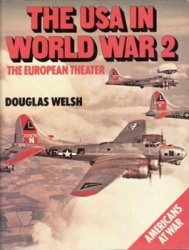As soon as the Germans surrendered, Truman cutoffLend-
Lease to Russia. Stalin's protests revealed the fundamental difference
in actual power between the two countries. The American
giant overflowed with prosperity and optimism. The population
had grown in the war despite the death toll and the mobilization
of millions of men. Full employment had been achieved.
National income had doubled in five years and the national
budget was balanced, although national debt had quadrupled.
Production had advanced in every sector, 33 per cent in agriculture,
40 per cent in petroleum, 400 per cent in iron ore.
Ninty-five million tons of steel left the furnaces. The shipyards
were launching two times as many ships each year as were sunk
by the German submarines during the worst days of the Battle
of the Atlantic. America had become the largest naval power in
the world, and she had almost a monopoly on intercontinental
air navigation.
Bv the end of the war 60 per cent of the world's gold reserves
were lodged in the reserve banks of the United States, and the
dollar was the only gold-based currency left. Although commercial
overproduction yielded large surpluses, and profits
were large, wealth was unevenly distributed. Workers' standard
of living had improved, but they objected to huge profits
distributed by manv businesses. Some regions, the South in
particular, were slightly poorer at the end of the war. Some
sectors of the population - Blacks, Puerto Ricans, Mexicans,
and the French Canadians —were relatively deprived and underdeveloped.
The American influence prevailed throughout the world.
Everyone owed America something. Canada and South America
were completely under her power, although South America did
not adjust easily to the American way of life, which benefited only
a privileged minority of the population. At the end of the war,
many soldiers returned with the idea that an era had ended, that
America would turn her back on the world and settle down again
to isolationist indifference. Her leaders, including President
Truman, were uncertain how to proceed, but America was now
too large a power to escape heavy foreign commitments. She
still had to come to terms with this. The end of the war marked
the rise of a new form of American involvement, in Asia especially,
as well as in Europe.




 World History
World History









